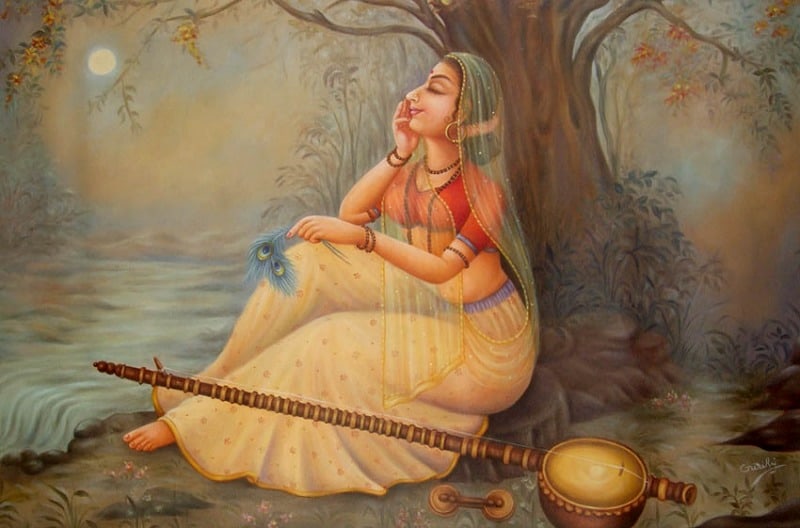Table of Contents Show
Mirabai, the celebrated saint-poetess of India, remains an enduring symbol of devotion and unwavering love for the divine. Born into royalty in the 15th century, her life’s journey would take her from the opulent courts of Rajasthan to the sacred realm of devotion to Lord Krishna. Mirabai’s life story is a tapestry woven with threads of spiritual awakening, divine communion, and the indomitable spirit of a woman who defied convention to follow the path of devotion.
Mirabai’s life stands as a vibrant thread, woven with unwavering devotion, spiritual depth, and poetic brilliance. Born into a royal family in 1498 in Merta, Rajasthan, she defied societal norms to become one of India’s most revered saint-poetesses.
Mirabai: Early Life and Divine Calling
The luminous life of Mirabai, the saint-poetess and devotee of Lord Krishna, began in the year 1498 in the village of Kurki, located in the Merta district of Rajasthan, India. She was born into the royal family of Ratan Singh, the reigning king of Merta. From the very inception of her life, there were signs that Mirabai was destined for a unique and extraordinary path.
Mirabai’s birth, steeped in legend and prophecy, was accompanied by auspicious signs that filled the hearts of her family with hope and wonder. It is said that at the moment of her birth, the temple bells rang on their own, and a celestial light enveloped her tiny form, leaving those in attendance astounded.
As she grew, young Mirabai exhibited a natural inclination towards the divine. Her love for Lord Krishna, whom she would come to regard as her eternal beloved, manifested at a tender age. She would often be found playing with her cherished Krishna idol, an intimate relationship that would blossom into a profound spiritual connection as the years passed.
Mirabai’s formative years were marked by the cultural richness of Rajasthan. Her upbringing was drenched in the folk songs, legends, and devotional fervor of the region. The stories of Lord Krishna’s divine exploits and his enchanting flute melodies cast a spell on her young heart.

In this nurturing environment, the seeds of devotion were sown deep within her soul. The legends of devotionally inclined saints and mystics, such as Kabir and Ravidas, would further shape her spiritual aspirations. These early influences would eventually culminate in Mirabai’s unshakable devotion to Lord Krishna and her transformation into one of the most celebrated saint-poets in India’s history.
Yet, Mirabai’s early life was not without its challenges. At the age of sixteen, she was married to Rana Kumbha of Mewar, a union that would introduce her to both the splendors of royalty and the constraints of conventional expectations. Her marriage, marked by stark contradictions, would become a significant chapter in her journey towards spiritual realization.
Despite the opulence of her royal surroundings, Mirabai’s heart remained steadfast in its devotion to Lord Krishna. Her divine love for the Lord transcended the boundaries of her worldly existence, and she saw her marriage as a sacred union with her beloved deity.
Mirabai’s early years were a tapestry of spiritual awakening, marked by her unwavering love for Lord Krishna and her growing inclination towards the path of devotion. Little did she know that her profound love for the divine would lead her on a journey that would inspire generations and establish her as a luminous figure in the pantheon of India’s saints and poets.
A Marriage of Contradictions
At the age of sixteen, Mirabai was married to Rana Kumbha of Mewar, cementing a union that would be marked by stark contradictions. While the marriage brought her into a world of grandeur and power, it also subjected her to the constraints of royal customs and expectations.
Mirabai’s devotion to Lord Krishna, however, remained unwavering, and she saw her marriage as a divine union with her beloved deity. Her songs and hymns expressed her deep longing for Krishna, and she often withdrew from the opulent court to seek solace in devotion, much to the bewilderment of her husband and in-laws.
Mirabai: The Melodies of Devotion
Mirabai’s poetic talents blossomed alongside her devotion. Her compositions, known as “bhajans” or devotional songs, were not mere verses but heartfelt expressions of her love and longing for Lord Krishna. Her poetic brilliance illuminated the medieval Rajput courts and temples.
Her bhajans, composed in Rajasthani and Braj Bhasha, were imbued with profound spirituality. They spoke of the pain of separation from the divine, the yearning of the soul for union, and the ecstasy of surrender. Her compositions resonated with the common folk as well as the learned, transcending barriers of caste, creed, and class.
Here are a couple of Mirabai’s bhajans (devotional songs) in Hindi:
बरसाने की छोरी रे (Barsane Ki Chhori Re)
बरसाने की छोरी रे, धूणी बन्ध माखन खायो,
इकलौती घर वाली रे, सखी मैं हूं इच्छायो।
मेरो दिल तूने तोड़ दियो, बिछड़न का आलम लायो,
जाग जाग वेला आयो, सखी मैं हूं इच्छायो।
गोविन्द मेरो सगुण पिया, रात सवेरा कहीं दिन दुवायो,
तुम सुनो मोहन बतायो, सखी मैं हूं इच्छायो।
पायला निहारुं (Payala Niharu)
पायला निहारुं घर जाऊं,
मीरा गिरिधर गोपाल कहाऊं।
बिन बताये उठती मेरी लाज,
कान्हा बिना किये बिचुआ मजाज।
पायला बिना निहार मोहें तरसाए,
तरसत है मीरा, जो देखि सरसाए।
अब तो देखो बत जी, निहारो,
मीरा के प्याले आप कहाँ बस जायो।
These bhajans by Mirabai are filled with deep devotion and longing for Lord Krishna. They capture the essence of her spiritual journey and continue to resonate with devotees seeking a profound connection with the divine.
Defiance and Persecution
Mirabai’s unorthodox devotion, coupled with her refusal to conform to societal norms, drew the ire of her family and the conservative elements in society. She faced persecution, with her detractors accusing her of deviating from her wifely duties and sullying the family’s honor.
Despite the challenges and social ostracism, Mirabai remained steadfast in her devotion. She often sought refuge in Vrindavan, the land closely associated with Lord Krishna, and her bhajans became a source of solace and inspiration for countless devotees.
The Legend Lives On
Mirabai’s life remains shrouded in legends and tales of her divine encounters. Stories of her miraculous experiences and her unwavering faith continue to captivate the hearts of millions. Her legacy endures through her bhajans, which are still sung and revered in temples and households across India.
In a world marked by convention and conformity, Mirabai’s life serves as a luminous example of unwavering devotion and the power of spiritual love. She transformed her personal quest for the divine into a universal message of devotion and surrender. Her story reminds us that true love, whether human or divine, transcends the boundaries of time and place, resonating through the ages as an eternal melody of the heart.







